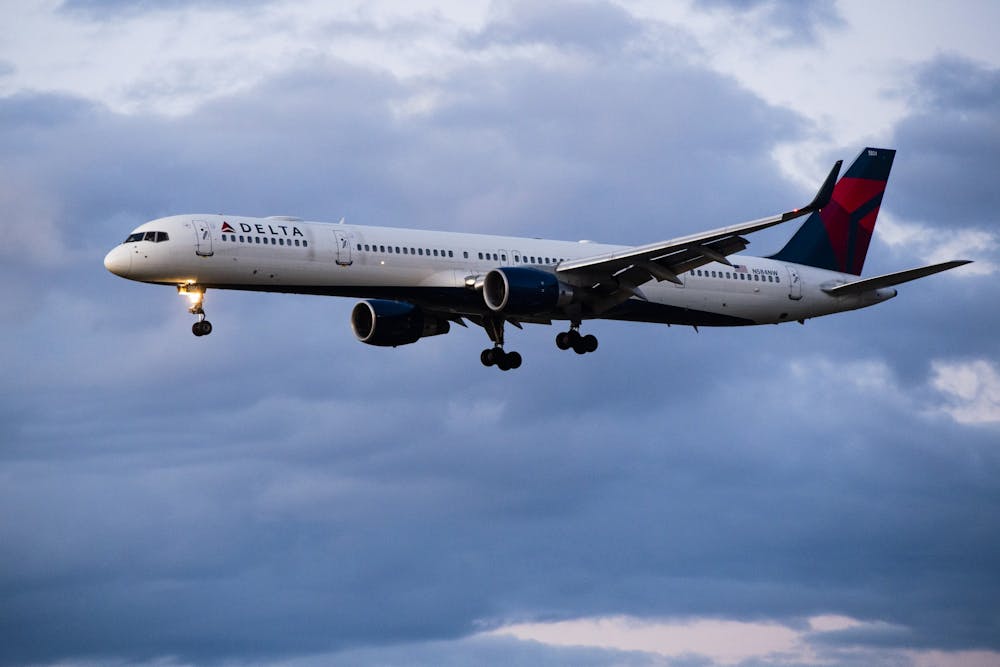Chandler Fritz was planning on teaching English at a Hungarian university for at least another four months.
A recent ASU graduate, Fritz was one of 21 ASU students who won a Fulbright award last year, 19 of which participated in the grant-funded U.S. student program that offers students an opportunity to go abroad for research, graduate study and teaching opportunities.
But during Fritz's time abroad, COVID-19 was gaining traction across the globe. Governments in multiple countries began effectively shutting down public life — suspending flights and trains, urging residents to stay home and discouraging public gatherings — while the rates of confirmed cases rose throughout the world.
The university Fritz taught at recently shut down in-person classes, but Fritz still wanted to stay to finish out the semester with his Hungarian Roma students.
He was eventually presented with a tough choice. The Fulbright program notified him that he either had to return to the U.S. because of concerns over coronavirus, or risk staying in Hungary and forgo receiving help in returning home later on.
In the past few weeks, situations like Fritz's have become the norm for ASU students studying abroad and working or researching outside of the U.S.
Earlier this month, ASU canceled all study abroad trips to South Korea, Italy, mainland China, Austria, Czech Republic, Denmark, France, Germany, Italy, Netherlands, Spain, Sweden and Switzerland.
The decision pushed hundreds of students across those countries to return from their studies overseas, a University official said.
Getting home
Within 24 hours of being told that he would finish his semester abroad in Spain, Trey Davis, an ASU senior studying communication, was told he would actually have to leave the country and return to the U.S.
Last week, President Donald Trump announced restrictions for travelers returning from Europe, a statement that many initially believed to be a suspension of all travel between Europe and the U.S.
Though the administration later clarified that this was not the case, students who were studying in Europe raced to figure out how they would get home before the restrictions were enforced, according to Ashley Dussault, a junior studying sustainability.
ASU's study abroad program assured Dussault that she would not have to go home unless Denmark, the country she was in, was declared a “Level 3” country by the Centers for Disease Control and Prevention.
Shortly afterward, most of Europe, including Denmark, was declared a Level 3 area.
“We went Sunday night, March 15, to the airport,” Dussault said. “We just looked on the monitor and every flight was like canceled, canceled, canceled, and at that moment we were like, 'Oh, we need to go home immediately.'”
Immediately afterward, Dussault and her boyfriend booked a flight home and began to pack up her dorm in Copenhagen.
For Davis, the situation was much the same — his study abroad program transitioned to an online format as he awaited word from ASU on whether or not to come home.
Once ASU notified him he should return, he packed up his things. Both Davis and Dussault said the notification was the only information they received from ASU about the status of study abroad students until March 20.
The University did not respond to request for comment by the time of publication.
Davis and Dussault's flights to the U.S. were routed through London first. All international flights to Phoenix Sky Harbor International Airport were limited, meaning that both flights had to make other stops before landing in Arizona.
For Davis, that meant he landed at Los Angeles International Airport and had his parents pick him up. On the other hand, Dussault had to make a stop in Chicago before landing in Phoenix.
The CDC has required that every international traveler returning to the U.S. fill out a simple questionnaire asking where they had been, if they felt sick and if they had been exposed to the coronavirus.
Once Davis and Dussault completed the questionnaires, they both had their temperatures taken. Dussault said that travelers were then separated into different groups based on their responses.
“The airports are the craziest place I've ever been in my life,” Davis said. “The way the CDC is handling the situation at the airports is extremely inefficient. It isn’t preventing the spread of disease — if anything, it’s spreading it because they’re isolating people together.”
Upon returning home, students who were studying abroad were instructed to quarantine themselves for 14 days, the suspected incubation period of the coronavirus. Those students also returned to a completely online University.
Read more: ASU extends online learning for duration of Spring semester
Davis, Dussault and Fritz have been fortunate enough to not show any symptoms of COVID-19 so far.
But for some students, their spring semester abroad ended by catching the illness that seemingly brought the whole world to a halt.
Madeline Snyder, a sophomore studying psychology at NAU, tested positive for coronavirus during her semester in Greece.
Though most symptoms of the virus have now subsided, she developed a sinus infection from them. After she recovers, she'll make arrangements to come back to her family's home in the Phoenix area. Her peers in the program have already been sent home.
Until recently, coronavirus "seemed like such a faraway issue," with just one case of the coronavirus in the country and the worse effects of the virus hitting other countries, Snyder said.
"I had heard about people being sent home from study abroad programs in Italy, but I was just holding out," she said. "I was hoping it would never get to Greece, and that it wouldn’t get that serious. We were all ignorant in how widespread it would get."
Around a week ago, she began experiencing symptoms of COVID-19. Soon after, one of her friends in Greece tested positive for it, prompting her to seek testing herself.
"I put two and two together and figured that I had also gotten it," she said.
Snyder said the attitude surrounding the virus in the U.S. is different depending on who you talk to.
"I think in the U.S., people are at different points — some people are taking it very seriously, some people aren’t taking it seriously at all," she said. "I think that right now, there’s still quite a few people my age who are using the rhetoric I was, like ‘Oh, it’s not going to affect you that much if I get sick, I’m not that worried.’"
Snyder said she received help from Deree College, or The American College of Greece, in seeking testing and treatment for her symptoms. The institution also communicated with NAU about her status and her plans to return home.
NAU also offered students who were stuck abroad a $500 reimbursement for their flights home.
Though it was disappointing for the semester to end the way it did, Snyder said it wasn't a difficult choice to quarantine herself after she began displaying symptoms.
"I know people feel like they have to give up a lot to make it through the times that we’re in currently, but it’s only temporary, and if we all do it now, it’ll get a lot better a lot faster," she said.
Financial help
The program took care of Fulbright winners like Fritz, offering to reimburse them for their plane tickets home and for any expenses that may arise from traveling back.
“It's a 'get out of jail free' card,” Fritz said.
Meanwhile, the University has offered ASU students $500 dollars to help them return home.
Davis said the money had been put into his student account, but that it was nothing more than a "nice gesture," as it wasn't enough to cover the cost of tickets home — not when the least expensive ones cost $3,000, and when fellow students spent upward of $9,000.
Since returning from Spain, ASU has not checked up on him, or even asked to see if he got home all right, Davis said.
“Luckily, we had the means to be able to travel home on such short notice and pay for those flights,” Davis said. “But, for a lot of students who are abroad, I'm sure that was not the case for them and this has probably sent them into either considerable debt or just left them stuck overseas.”
Dussault was able to submit a disruption form to her study abroad program to try and get back some of her money for the trip. She felt that ASU had little communication with her and other study abroad students before directing them to come home, but said that the University had otherwise done a good job.
“I think it would have been nice if they had sent some sort of email from the beginning saying, like, 'Expect a response within this timeframe,'” Dussault said. “Because at that point (before the announcement), I was just sitting in Denmark wondering what the next steps were because they hadn't sent me any information.”
Going forward
For study abroad students and Fulbright winners alike, returning home means a complete change in their original plans for the spring semester.
Students have potentially lost thousands of dollars during their journeys home. And all the typical opportunities to learn from international studies has been cut short.
Despite this, Davis and Dussault have both been able to register for Session B courses at ASU, or continue to take classes they were taking in Europe in an online format.
"Most of these students are able to complete their study abroad program courses online, but course completion options are still uncertain for other students who are awaiting details from their host institution," a University official said. "In addition to any credits that they are able to complete from their study abroad programs, many of these students have also registered in session B classes at ASU."
Opportunities for students to do grant-funded research, like Fritz's work through Fulbright or the work of Angeline Young, a doctoral student at the College of Liberal Arts and Sciences studying how transnationalism affects the Chinese in Italy, have been stopped until COVID-19 runs its course.
“One professor in Budapest said it feels like the 21st century is falling down on them because these universities can't catch up,” Fritz said. “I was having to teach 20 teachers today how to use Zoom, so they're definitely panicking. They don't know how they're going to be able to continue teaching.”
Fritz added that the situation there was much the same in the U.S. — Hungary also rests in a state of uncertainty on what will happen for small businesses, populations that already suffer the most, like the homeless population, and Roma students and their families.
Leaving them behind will be difficult, knowing the situation will likely only deteriorate further for everyone, especially for those most vulnerable, Fritz said.
“Out here they really live in the sticks,” Fritz said. “They’re not going to get groceries delivered, they’re not going to be able to go to the city to get groceries; that sort of thing over here, I’m afraid will get kicked under the rug.”
Reach the reporter at wmyskow@asu.edu and follow @wmyskow on Twitter.
Like The State Press on Facebook and follow @statepress on Twitter.

Wyatt Myskow is the project manager at The State Press, where he oversees enterprise stories for the publication. He also works at The Arizona Republic, where he covers the cities of Peoria and Surprise.




